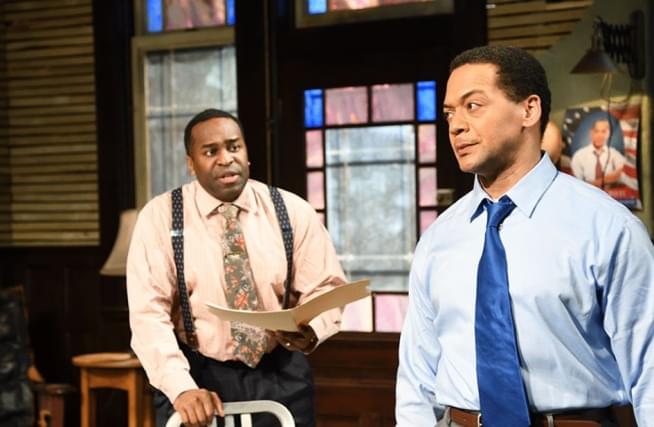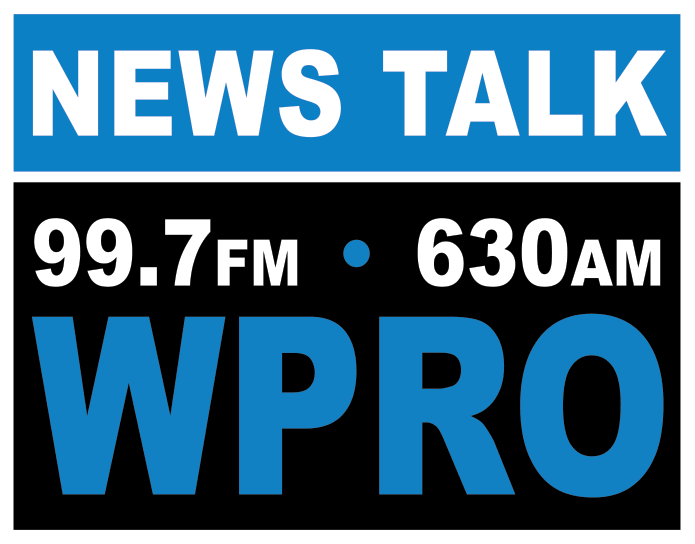
By Kimberly Rau
There is so much to praise about the late August Wilson’s play “Radio Golf,” the last in a series of 10 plays that chronicle various aspects of Black life in America throughout the twentieth century. When a fantastically nuanced script is picked up by a strong director and equally adept group of actors, the result is riveting theater, and another important piece of social commentary that should be seen.
Harmond Wilks is running for mayor in Pittsburgh in the 1990s with the help of his wife/campaign manager, Mame, and his close friend Roosevelt Hicks. Wilks’s key to victory is his revitalization of the Hill–an area so run down that the city is about to declare it blighted to net millions of dollars in federal aid to fix it up. Tear down the abandoned houses. Bring in a Whole Foods and a Starbucks. There’s just one problem: A local crazy guy is claiming to own one of the houses slated for destruction and has started painting it so his daughter can move in. And while Wilks and Roosevelt dismiss him at first, it turns out Elder Joseph Barlow isn’t so crazy after all, and the house isn’t exactly owned free and clear by their development company. As Wilks starts sorting between his desires to become mayor, clean up the neighborhood and somehow not erase the community that still lives there, it becomes clear those closest to him are more willing to embrace gentrification than the past. In a depressingly real denouement, we learn that the best of intentions can still cause a ration of heartache for those fighting the system…both for Wilks and Barlow, and everyone in their sphere of influence.
The show tackles a number of difficult topics in a masterful way. Wilks warns Hicks that he is only being offered certain opportunities by White businessmen because they need a “minority face” to get certain monetary incentives, but Hicks argues back that at least this way, he gets a seat at the table. He knows it’s a game, but it’s a game he’s willing to play to get ahead…even as others warn him that historically, anytime Black people start to become successful, the rules of the game seem to change without notice. Mame Wilks supports the revitalization project but does not want to move back to the Hill, stating that people already assume that all Black people live in that neighborhood. And as the jack of all trades Sterling Johnson, who knows Wilks from the old neighborhood, points out, Wilks’s goal of “bringing back” the Hill is a false promise. You can’t bring it back, he says. You can only put something new in there. And that new thing may be what pushes more Black people out to make way for a Barnes and Noble.
From start to finish (and the play is two and a half hours long, but certainly doesn’t feel like it) Radio Golf is thought-provoking, uncomfortable in an important way and excellent work from every actor on stage. This is especially evident with JeMario Stills playing Sterling Johnson, who stepped in with a mere two days’ notice when Dereks Thomas got injured and could not perform on opening night. Stills had a script in his hand but that was the last thing you noticed in the face of a brilliant performance. Joe Wilson Jr. as the well-intentioned but over-burdened Harmond Wilks is riveting on his own and engaging with everyone he encounters on the stage. His back and forth with stage wife Tonia Jackson, who plays the headstrong Mame Wilks, is believable and relatable, and Jackson is fantastic in her own right as well. Omar Robinson takes a tough character (the get-ahead-at-all-costs Roosevelt Hicks) and infuses just enough sympathy for him that we feel his frustration, even he frustrates everyone with his stubbornness. And while everyone is, truly, incredible in this show, it’s the masterful performance from Ricardo Pitts-Wiley as Elder Joseph Barlow that steals the show. Every move, hand shake, facial expression and nuance is perfectly executed in a performance that will have you fully engaged in the moment.
It’s a strong script and company, and in the hands of director Jude Sandy (with assistant directors Kevaughn Harvey and JeMario Stills), this is must-see theater.
Radio Golf runs through March 1 at Trinity Repertory, 201 Washington St., Providence. Tickets may be obtained at the box office, online at trinityrep.com or by calling 401-351-4242.













